Practical Competency Portfolio: Children's Services Diploma
VerifiedAdded on 2022/08/14
|9
|2286
|12
Practical Assignment
AI Summary
This assignment is a practical competency portfolio for a Diploma in Children's Services, focusing on the application of the Early Years Learning Framework (EYLF) in a kindergarten setting. The portfolio documents observations and reflections on the center's practices, policies, and procedures, specifically addressing the principles of Belonging, Being, and Becoming. It examines how the center fosters secure relationships, partnerships with families and professionals, high expectations and equity, respect for diversity, and ongoing learning and reflective practice. The portfolio includes reflections on linguistic and cultural diversity, outdoor safety, and environmental care, as well as examples of educational program development and log book records demonstrating adherence to EYLF principles. The assignment highlights how the center supports children's identity, wellbeing, and effective communication through various activities and interactions.
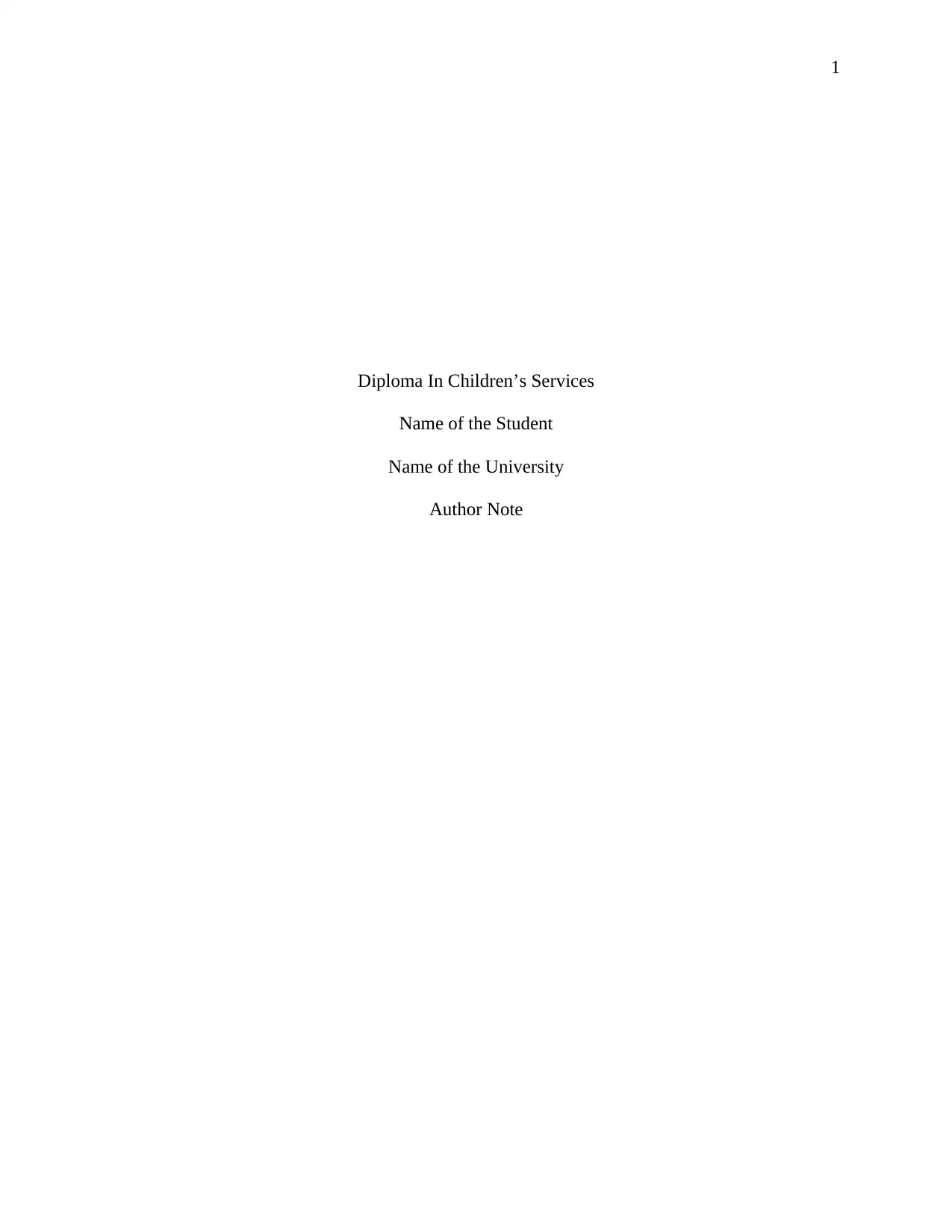
1
Diploma In Children’s Services
Name of the Student
Name of the University
Author Note
Diploma In Children’s Services
Name of the Student
Name of the University
Author Note
Paraphrase This Document
Need a fresh take? Get an instant paraphrase of this document with our AI Paraphraser
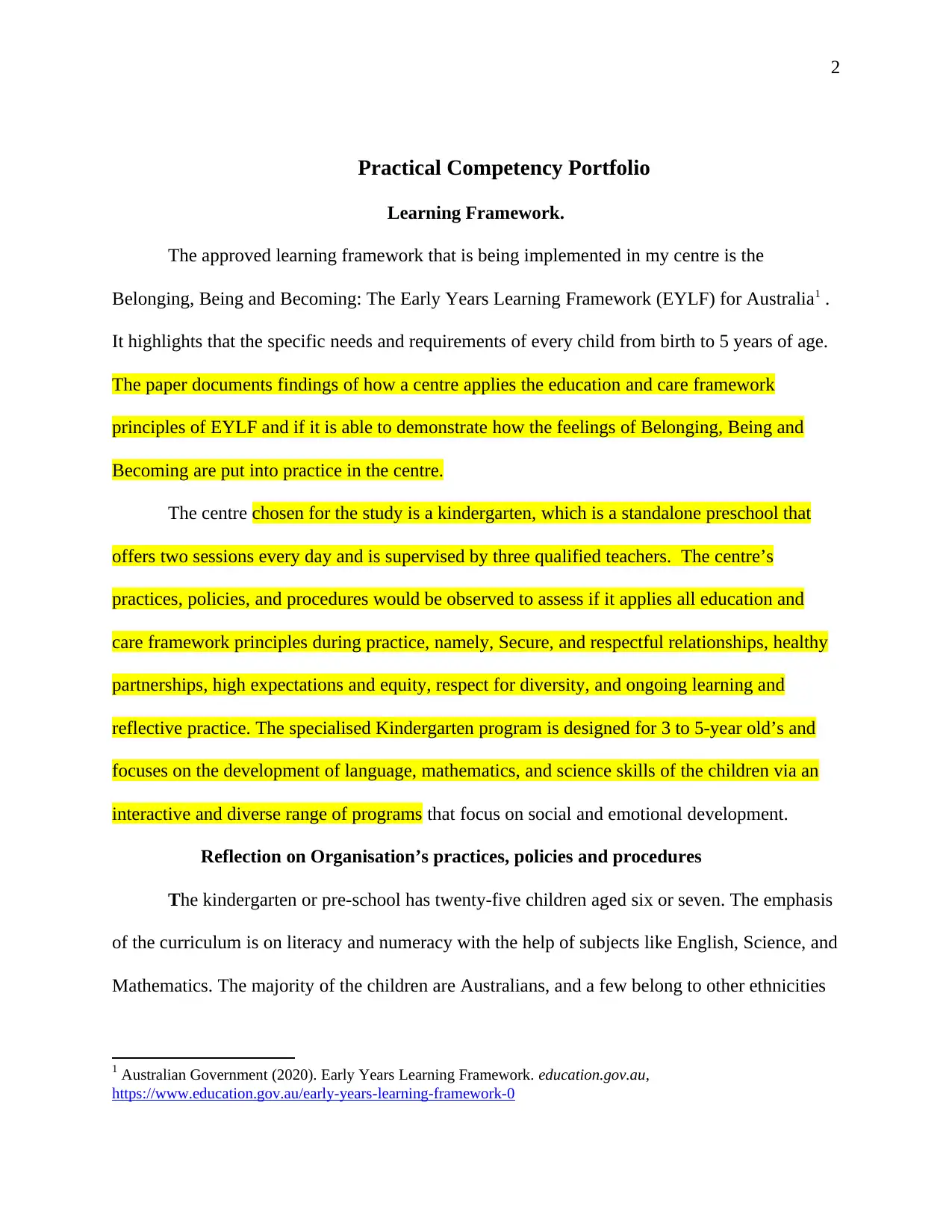
2
Practical Competency Portfolio
Learning Framework.
The approved learning framework that is being implemented in my centre is the
Belonging, Being and Becoming: The Early Years Learning Framework (EYLF) for Australia1 .
It highlights that the specific needs and requirements of every child from birth to 5 years of age.
The paper documents findings of how a centre applies the education and care framework
principles of EYLF and if it is able to demonstrate how the feelings of Belonging, Being and
Becoming are put into practice in the centre.
The centre chosen for the study is a kindergarten, which is a standalone preschool that
offers two sessions every day and is supervised by three qualified teachers. The centre’s
practices, policies, and procedures would be observed to assess if it applies all education and
care framework principles during practice, namely, Secure, and respectful relationships, healthy
partnerships, high expectations and equity, respect for diversity, and ongoing learning and
reflective practice. The specialised Kindergarten program is designed for 3 to 5-year old’s and
focuses on the development of language, mathematics, and science skills of the children via an
interactive and diverse range of programs that focus on social and emotional development.
Reflection on Organisation’s practices, policies and procedures
The kindergarten or pre-school has twenty-five children aged six or seven. The emphasis
of the curriculum is on literacy and numeracy with the help of subjects like English, Science, and
Mathematics. The majority of the children are Australians, and a few belong to other ethnicities
1 Australian Government (2020). Early Years Learning Framework. education.gov.au,
https://www.education.gov.au/early-years-learning-framework-0
Practical Competency Portfolio
Learning Framework.
The approved learning framework that is being implemented in my centre is the
Belonging, Being and Becoming: The Early Years Learning Framework (EYLF) for Australia1 .
It highlights that the specific needs and requirements of every child from birth to 5 years of age.
The paper documents findings of how a centre applies the education and care framework
principles of EYLF and if it is able to demonstrate how the feelings of Belonging, Being and
Becoming are put into practice in the centre.
The centre chosen for the study is a kindergarten, which is a standalone preschool that
offers two sessions every day and is supervised by three qualified teachers. The centre’s
practices, policies, and procedures would be observed to assess if it applies all education and
care framework principles during practice, namely, Secure, and respectful relationships, healthy
partnerships, high expectations and equity, respect for diversity, and ongoing learning and
reflective practice. The specialised Kindergarten program is designed for 3 to 5-year old’s and
focuses on the development of language, mathematics, and science skills of the children via an
interactive and diverse range of programs that focus on social and emotional development.
Reflection on Organisation’s practices, policies and procedures
The kindergarten or pre-school has twenty-five children aged six or seven. The emphasis
of the curriculum is on literacy and numeracy with the help of subjects like English, Science, and
Mathematics. The majority of the children are Australians, and a few belong to other ethnicities
1 Australian Government (2020). Early Years Learning Framework. education.gov.au,
https://www.education.gov.au/early-years-learning-framework-0
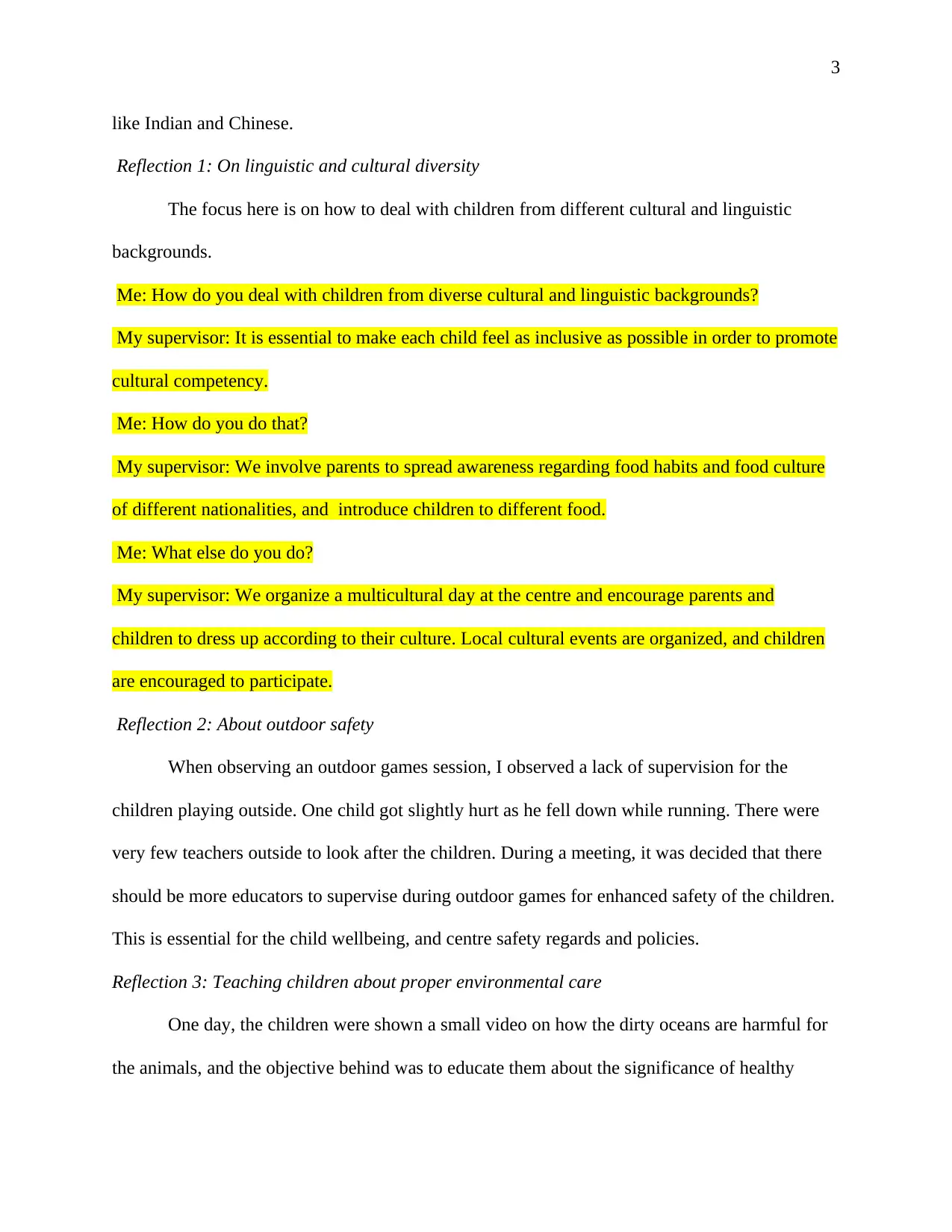
3
like Indian and Chinese.
Reflection 1: On linguistic and cultural diversity
The focus here is on how to deal with children from different cultural and linguistic
backgrounds.
Me: How do you deal with children from diverse cultural and linguistic backgrounds?
My supervisor: It is essential to make each child feel as inclusive as possible in order to promote
cultural competency.
Me: How do you do that?
My supervisor: We involve parents to spread awareness regarding food habits and food culture
of different nationalities, and introduce children to different food.
Me: What else do you do?
My supervisor: We organize a multicultural day at the centre and encourage parents and
children to dress up according to their culture. Local cultural events are organized, and children
are encouraged to participate.
Reflection 2: About outdoor safety
When observing an outdoor games session, I observed a lack of supervision for the
children playing outside. One child got slightly hurt as he fell down while running. There were
very few teachers outside to look after the children. During a meeting, it was decided that there
should be more educators to supervise during outdoor games for enhanced safety of the children.
This is essential for the child wellbeing, and centre safety regards and policies.
Reflection 3: Teaching children about proper environmental care
One day, the children were shown a small video on how the dirty oceans are harmful for
the animals, and the objective behind was to educate them about the significance of healthy
like Indian and Chinese.
Reflection 1: On linguistic and cultural diversity
The focus here is on how to deal with children from different cultural and linguistic
backgrounds.
Me: How do you deal with children from diverse cultural and linguistic backgrounds?
My supervisor: It is essential to make each child feel as inclusive as possible in order to promote
cultural competency.
Me: How do you do that?
My supervisor: We involve parents to spread awareness regarding food habits and food culture
of different nationalities, and introduce children to different food.
Me: What else do you do?
My supervisor: We organize a multicultural day at the centre and encourage parents and
children to dress up according to their culture. Local cultural events are organized, and children
are encouraged to participate.
Reflection 2: About outdoor safety
When observing an outdoor games session, I observed a lack of supervision for the
children playing outside. One child got slightly hurt as he fell down while running. There were
very few teachers outside to look after the children. During a meeting, it was decided that there
should be more educators to supervise during outdoor games for enhanced safety of the children.
This is essential for the child wellbeing, and centre safety regards and policies.
Reflection 3: Teaching children about proper environmental care
One day, the children were shown a small video on how the dirty oceans are harmful for
the animals, and the objective behind was to educate them about the significance of healthy
⊘ This is a preview!⊘
Do you want full access?
Subscribe today to unlock all pages.

Trusted by 1+ million students worldwide
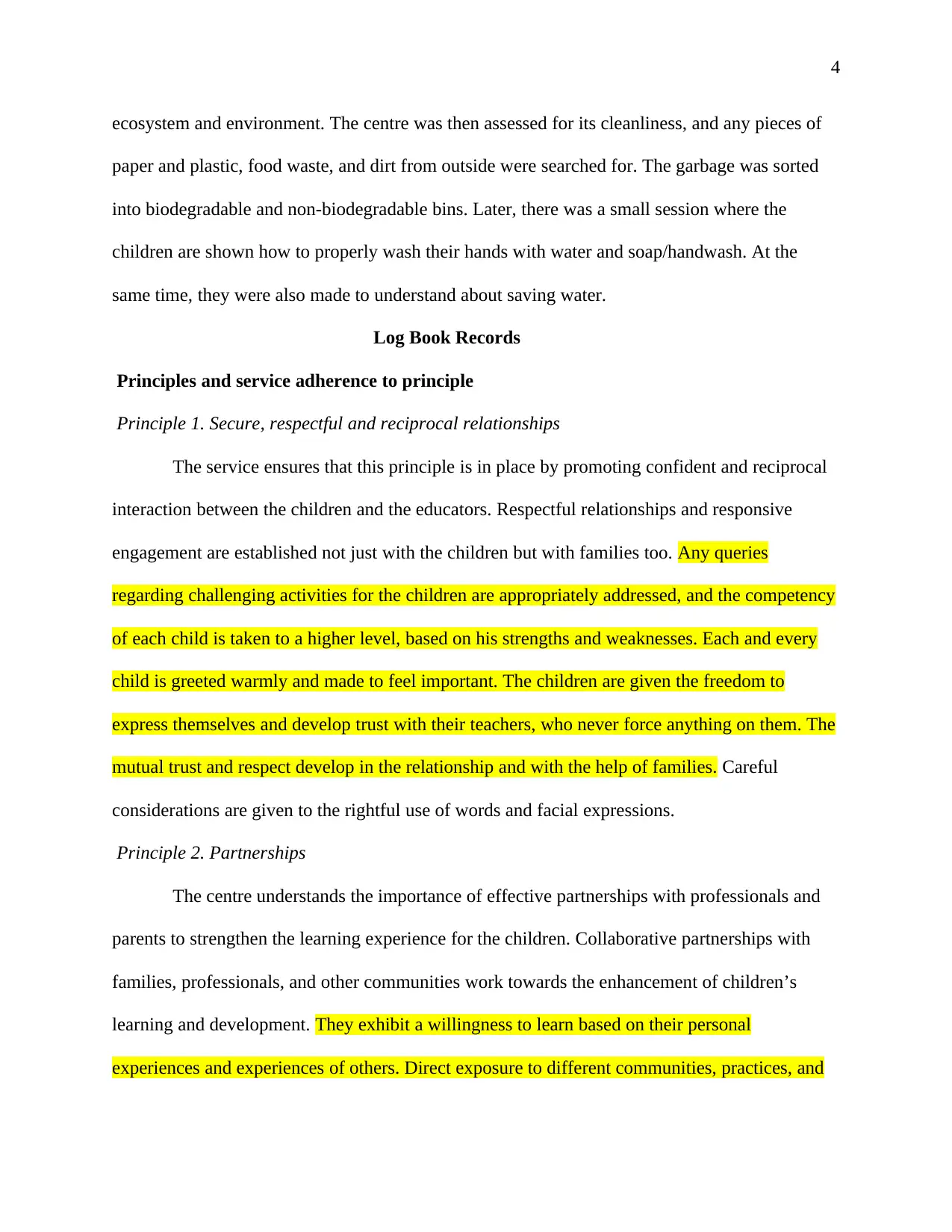
4
ecosystem and environment. The centre was then assessed for its cleanliness, and any pieces of
paper and plastic, food waste, and dirt from outside were searched for. The garbage was sorted
into biodegradable and non-biodegradable bins. Later, there was a small session where the
children are shown how to properly wash their hands with water and soap/handwash. At the
same time, they were also made to understand about saving water.
Log Book Records
Principles and service adherence to principle
Principle 1. Secure, respectful and reciprocal relationships
The service ensures that this principle is in place by promoting confident and reciprocal
interaction between the children and the educators. Respectful relationships and responsive
engagement are established not just with the children but with families too. Any queries
regarding challenging activities for the children are appropriately addressed, and the competency
of each child is taken to a higher level, based on his strengths and weaknesses. Each and every
child is greeted warmly and made to feel important. The children are given the freedom to
express themselves and develop trust with their teachers, who never force anything on them. The
mutual trust and respect develop in the relationship and with the help of families. Careful
considerations are given to the rightful use of words and facial expressions.
Principle 2. Partnerships
The centre understands the importance of effective partnerships with professionals and
parents to strengthen the learning experience for the children. Collaborative partnerships with
families, professionals, and other communities work towards the enhancement of children’s
learning and development. They exhibit a willingness to learn based on their personal
experiences and experiences of others. Direct exposure to different communities, practices, and
ecosystem and environment. The centre was then assessed for its cleanliness, and any pieces of
paper and plastic, food waste, and dirt from outside were searched for. The garbage was sorted
into biodegradable and non-biodegradable bins. Later, there was a small session where the
children are shown how to properly wash their hands with water and soap/handwash. At the
same time, they were also made to understand about saving water.
Log Book Records
Principles and service adherence to principle
Principle 1. Secure, respectful and reciprocal relationships
The service ensures that this principle is in place by promoting confident and reciprocal
interaction between the children and the educators. Respectful relationships and responsive
engagement are established not just with the children but with families too. Any queries
regarding challenging activities for the children are appropriately addressed, and the competency
of each child is taken to a higher level, based on his strengths and weaknesses. Each and every
child is greeted warmly and made to feel important. The children are given the freedom to
express themselves and develop trust with their teachers, who never force anything on them. The
mutual trust and respect develop in the relationship and with the help of families. Careful
considerations are given to the rightful use of words and facial expressions.
Principle 2. Partnerships
The centre understands the importance of effective partnerships with professionals and
parents to strengthen the learning experience for the children. Collaborative partnerships with
families, professionals, and other communities work towards the enhancement of children’s
learning and development. They exhibit a willingness to learn based on their personal
experiences and experiences of others. Direct exposure to different communities, practices, and
Paraphrase This Document
Need a fresh take? Get an instant paraphrase of this document with our AI Paraphraser
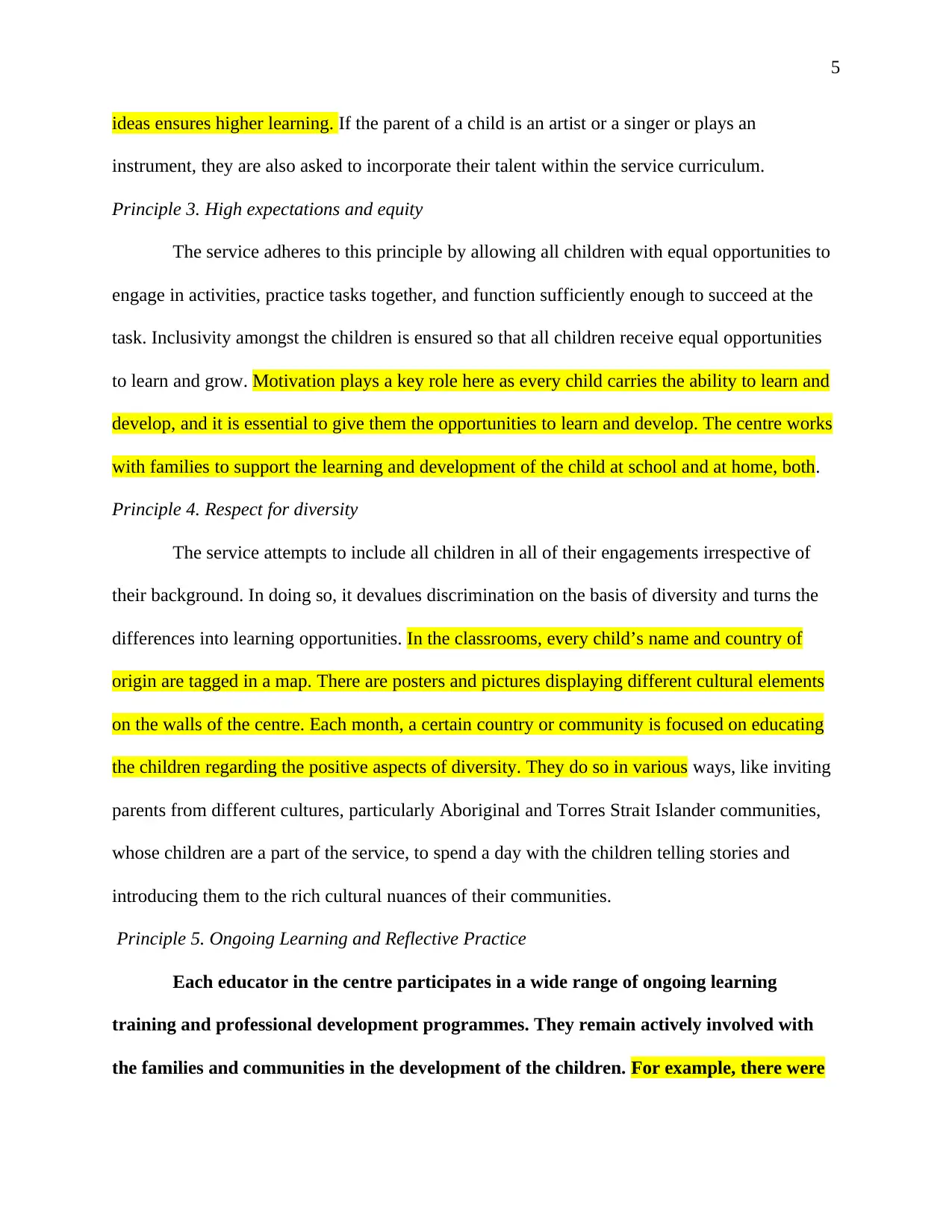
5
ideas ensures higher learning. If the parent of a child is an artist or a singer or plays an
instrument, they are also asked to incorporate their talent within the service curriculum.
Principle 3. High expectations and equity
The service adheres to this principle by allowing all children with equal opportunities to
engage in activities, practice tasks together, and function sufficiently enough to succeed at the
task. Inclusivity amongst the children is ensured so that all children receive equal opportunities
to learn and grow. Motivation plays a key role here as every child carries the ability to learn and
develop, and it is essential to give them the opportunities to learn and develop. The centre works
with families to support the learning and development of the child at school and at home, both.
Principle 4. Respect for diversity
The service attempts to include all children in all of their engagements irrespective of
their background. In doing so, it devalues discrimination on the basis of diversity and turns the
differences into learning opportunities. In the classrooms, every child’s name and country of
origin are tagged in a map. There are posters and pictures displaying different cultural elements
on the walls of the centre. Each month, a certain country or community is focused on educating
the children regarding the positive aspects of diversity. They do so in various ways, like inviting
parents from different cultures, particularly Aboriginal and Torres Strait Islander communities,
whose children are a part of the service, to spend a day with the children telling stories and
introducing them to the rich cultural nuances of their communities.
Principle 5. Ongoing Learning and Reflective Practice
Each educator in the centre participates in a wide range of ongoing learning
training and professional development programmes. They remain actively involved with
the families and communities in the development of the children. For example, there were
ideas ensures higher learning. If the parent of a child is an artist or a singer or plays an
instrument, they are also asked to incorporate their talent within the service curriculum.
Principle 3. High expectations and equity
The service adheres to this principle by allowing all children with equal opportunities to
engage in activities, practice tasks together, and function sufficiently enough to succeed at the
task. Inclusivity amongst the children is ensured so that all children receive equal opportunities
to learn and grow. Motivation plays a key role here as every child carries the ability to learn and
develop, and it is essential to give them the opportunities to learn and develop. The centre works
with families to support the learning and development of the child at school and at home, both.
Principle 4. Respect for diversity
The service attempts to include all children in all of their engagements irrespective of
their background. In doing so, it devalues discrimination on the basis of diversity and turns the
differences into learning opportunities. In the classrooms, every child’s name and country of
origin are tagged in a map. There are posters and pictures displaying different cultural elements
on the walls of the centre. Each month, a certain country or community is focused on educating
the children regarding the positive aspects of diversity. They do so in various ways, like inviting
parents from different cultures, particularly Aboriginal and Torres Strait Islander communities,
whose children are a part of the service, to spend a day with the children telling stories and
introducing them to the rich cultural nuances of their communities.
Principle 5. Ongoing Learning and Reflective Practice
Each educator in the centre participates in a wide range of ongoing learning
training and professional development programmes. They remain actively involved with
the families and communities in the development of the children. For example, there were
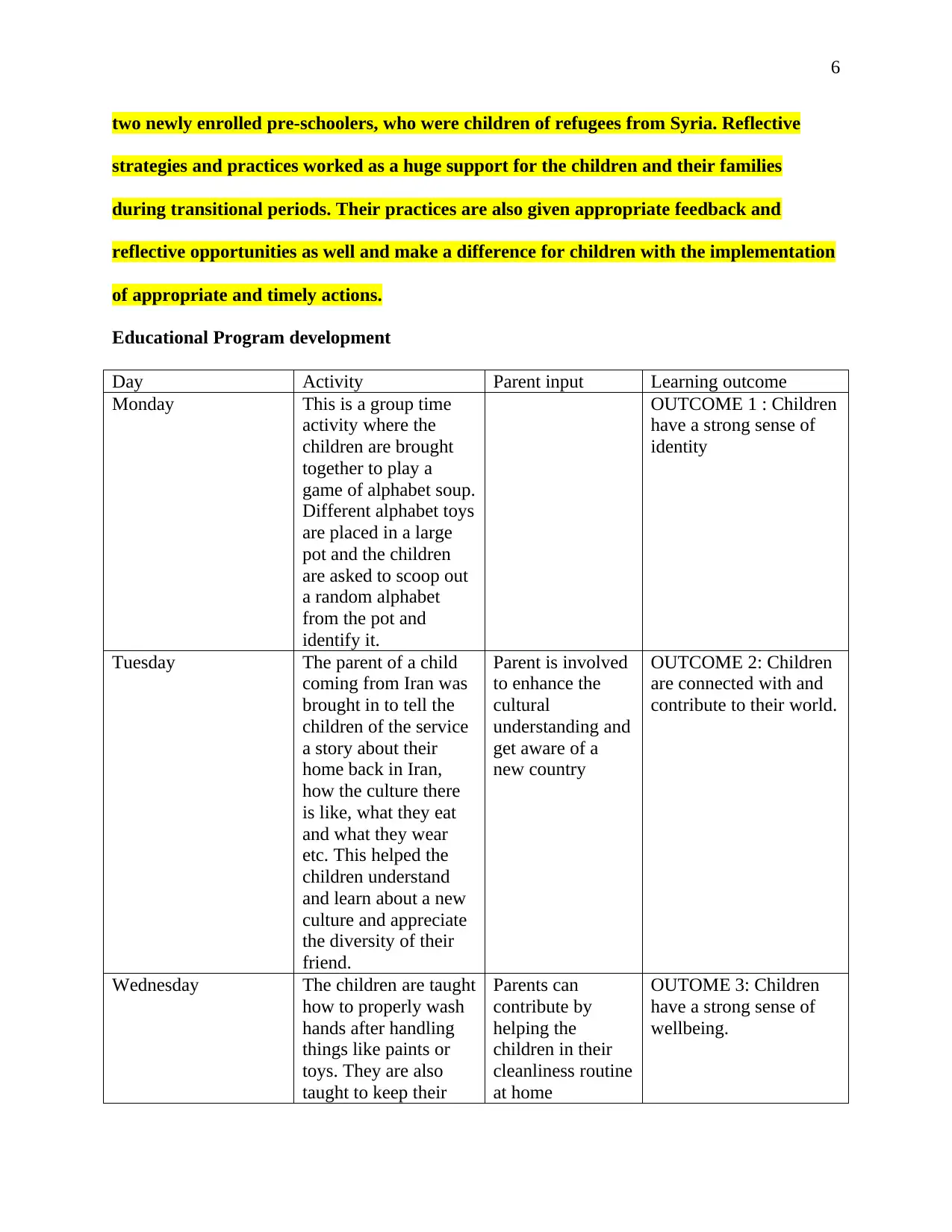
6
two newly enrolled pre-schoolers, who were children of refugees from Syria. Reflective
strategies and practices worked as a huge support for the children and their families
during transitional periods. Their practices are also given appropriate feedback and
reflective opportunities as well and make a difference for children with the implementation
of appropriate and timely actions.
Educational Program development
Day Activity Parent input Learning outcome
Monday This is a group time
activity where the
children are brought
together to play a
game of alphabet soup.
Different alphabet toys
are placed in a large
pot and the children
are asked to scoop out
a random alphabet
from the pot and
identify it.
OUTCOME 1 : Children
have a strong sense of
identity
Tuesday The parent of a child
coming from Iran was
brought in to tell the
children of the service
a story about their
home back in Iran,
how the culture there
is like, what they eat
and what they wear
etc. This helped the
children understand
and learn about a new
culture and appreciate
the diversity of their
friend.
Parent is involved
to enhance the
cultural
understanding and
get aware of a
new country
OUTCOME 2: Children
are connected with and
contribute to their world.
Wednesday The children are taught
how to properly wash
hands after handling
things like paints or
toys. They are also
taught to keep their
Parents can
contribute by
helping the
children in their
cleanliness routine
at home
OUTOME 3: Children
have a strong sense of
wellbeing.
two newly enrolled pre-schoolers, who were children of refugees from Syria. Reflective
strategies and practices worked as a huge support for the children and their families
during transitional periods. Their practices are also given appropriate feedback and
reflective opportunities as well and make a difference for children with the implementation
of appropriate and timely actions.
Educational Program development
Day Activity Parent input Learning outcome
Monday This is a group time
activity where the
children are brought
together to play a
game of alphabet soup.
Different alphabet toys
are placed in a large
pot and the children
are asked to scoop out
a random alphabet
from the pot and
identify it.
OUTCOME 1 : Children
have a strong sense of
identity
Tuesday The parent of a child
coming from Iran was
brought in to tell the
children of the service
a story about their
home back in Iran,
how the culture there
is like, what they eat
and what they wear
etc. This helped the
children understand
and learn about a new
culture and appreciate
the diversity of their
friend.
Parent is involved
to enhance the
cultural
understanding and
get aware of a
new country
OUTCOME 2: Children
are connected with and
contribute to their world.
Wednesday The children are taught
how to properly wash
hands after handling
things like paints or
toys. They are also
taught to keep their
Parents can
contribute by
helping the
children in their
cleanliness routine
at home
OUTOME 3: Children
have a strong sense of
wellbeing.
⊘ This is a preview!⊘
Do you want full access?
Subscribe today to unlock all pages.

Trusted by 1+ million students worldwide
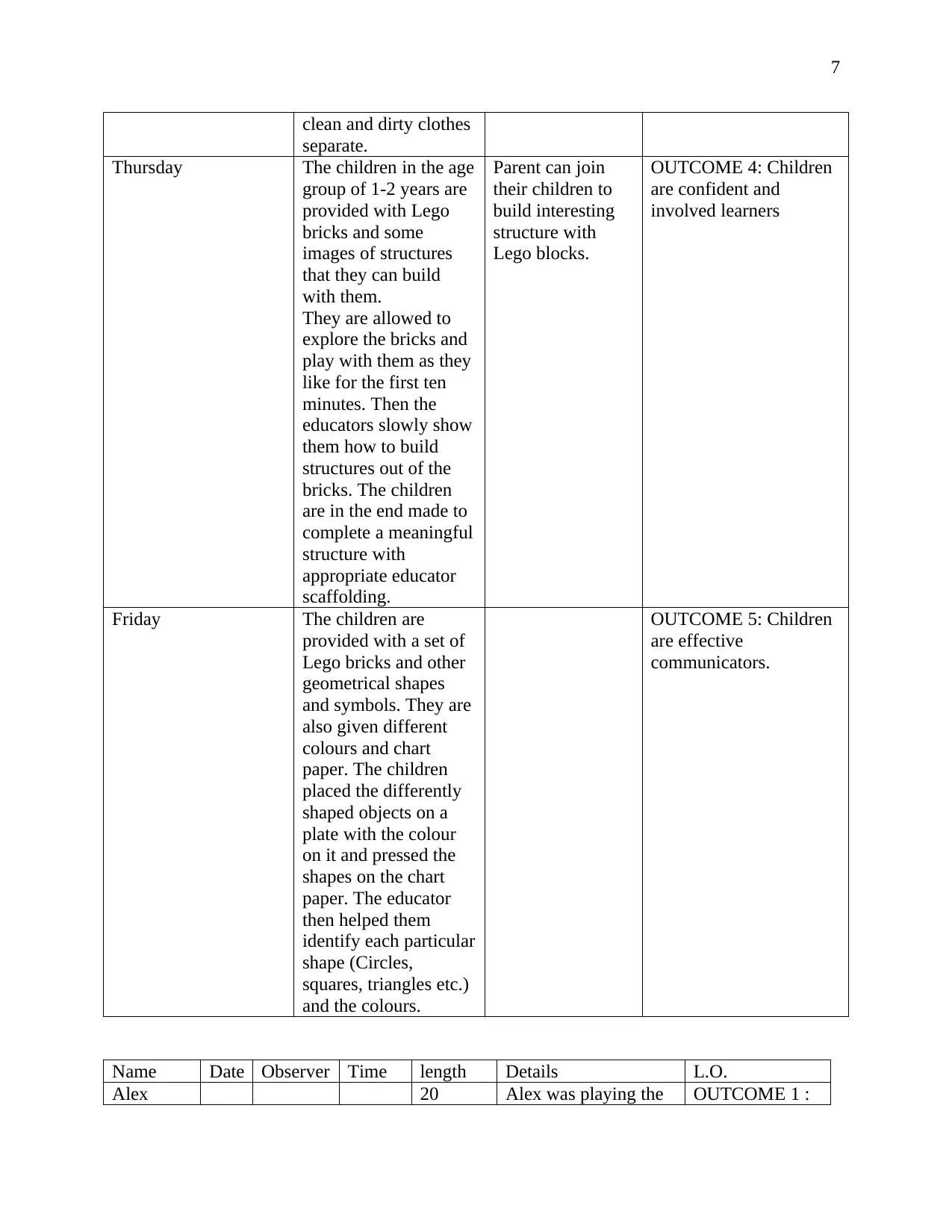
7
clean and dirty clothes
separate.
Thursday The children in the age
group of 1-2 years are
provided with Lego
bricks and some
images of structures
that they can build
with them.
They are allowed to
explore the bricks and
play with them as they
like for the first ten
minutes. Then the
educators slowly show
them how to build
structures out of the
bricks. The children
are in the end made to
complete a meaningful
structure with
appropriate educator
scaffolding.
Parent can join
their children to
build interesting
structure with
Lego blocks.
OUTCOME 4: Children
are confident and
involved learners
Friday The children are
provided with a set of
Lego bricks and other
geometrical shapes
and symbols. They are
also given different
colours and chart
paper. The children
placed the differently
shaped objects on a
plate with the colour
on it and pressed the
shapes on the chart
paper. The educator
then helped them
identify each particular
shape (Circles,
squares, triangles etc.)
and the colours.
OUTCOME 5: Children
are effective
communicators.
Name Date Observer Time length Details L.O.
Alex 20 Alex was playing the OUTCOME 1 :
clean and dirty clothes
separate.
Thursday The children in the age
group of 1-2 years are
provided with Lego
bricks and some
images of structures
that they can build
with them.
They are allowed to
explore the bricks and
play with them as they
like for the first ten
minutes. Then the
educators slowly show
them how to build
structures out of the
bricks. The children
are in the end made to
complete a meaningful
structure with
appropriate educator
scaffolding.
Parent can join
their children to
build interesting
structure with
Lego blocks.
OUTCOME 4: Children
are confident and
involved learners
Friday The children are
provided with a set of
Lego bricks and other
geometrical shapes
and symbols. They are
also given different
colours and chart
paper. The children
placed the differently
shaped objects on a
plate with the colour
on it and pressed the
shapes on the chart
paper. The educator
then helped them
identify each particular
shape (Circles,
squares, triangles etc.)
and the colours.
OUTCOME 5: Children
are effective
communicators.
Name Date Observer Time length Details L.O.
Alex 20 Alex was playing the OUTCOME 1 :
Paraphrase This Document
Need a fresh take? Get an instant paraphrase of this document with our AI Paraphraser
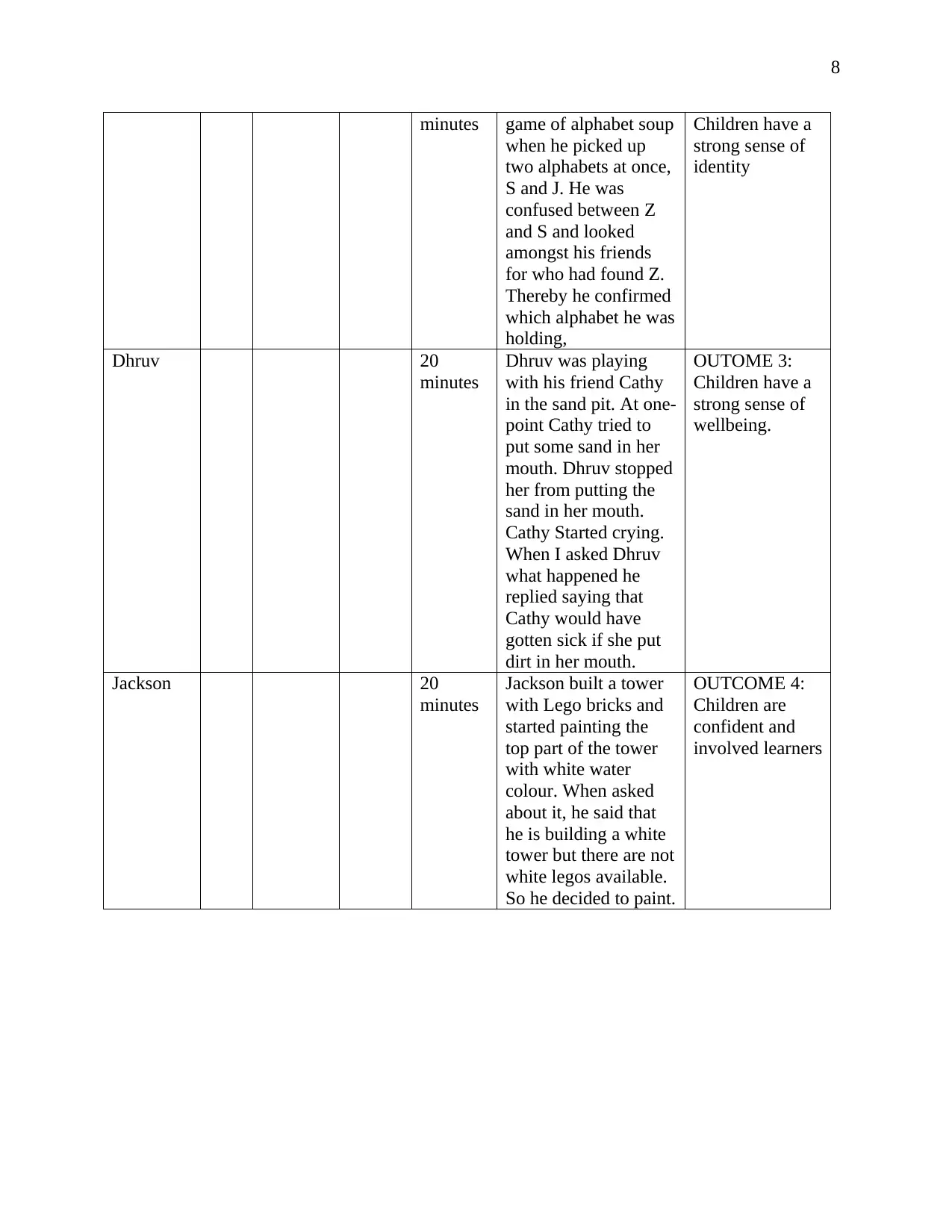
8
minutes game of alphabet soup
when he picked up
two alphabets at once,
S and J. He was
confused between Z
and S and looked
amongst his friends
for who had found Z.
Thereby he confirmed
which alphabet he was
holding,
Children have a
strong sense of
identity
Dhruv 20
minutes
Dhruv was playing
with his friend Cathy
in the sand pit. At one-
point Cathy tried to
put some sand in her
mouth. Dhruv stopped
her from putting the
sand in her mouth.
Cathy Started crying.
When I asked Dhruv
what happened he
replied saying that
Cathy would have
gotten sick if she put
dirt in her mouth.
OUTOME 3:
Children have a
strong sense of
wellbeing.
Jackson 20
minutes
Jackson built a tower
with Lego bricks and
started painting the
top part of the tower
with white water
colour. When asked
about it, he said that
he is building a white
tower but there are not
white legos available.
So he decided to paint.
OUTCOME 4:
Children are
confident and
involved learners
minutes game of alphabet soup
when he picked up
two alphabets at once,
S and J. He was
confused between Z
and S and looked
amongst his friends
for who had found Z.
Thereby he confirmed
which alphabet he was
holding,
Children have a
strong sense of
identity
Dhruv 20
minutes
Dhruv was playing
with his friend Cathy
in the sand pit. At one-
point Cathy tried to
put some sand in her
mouth. Dhruv stopped
her from putting the
sand in her mouth.
Cathy Started crying.
When I asked Dhruv
what happened he
replied saying that
Cathy would have
gotten sick if she put
dirt in her mouth.
OUTOME 3:
Children have a
strong sense of
wellbeing.
Jackson 20
minutes
Jackson built a tower
with Lego bricks and
started painting the
top part of the tower
with white water
colour. When asked
about it, he said that
he is building a white
tower but there are not
white legos available.
So he decided to paint.
OUTCOME 4:
Children are
confident and
involved learners
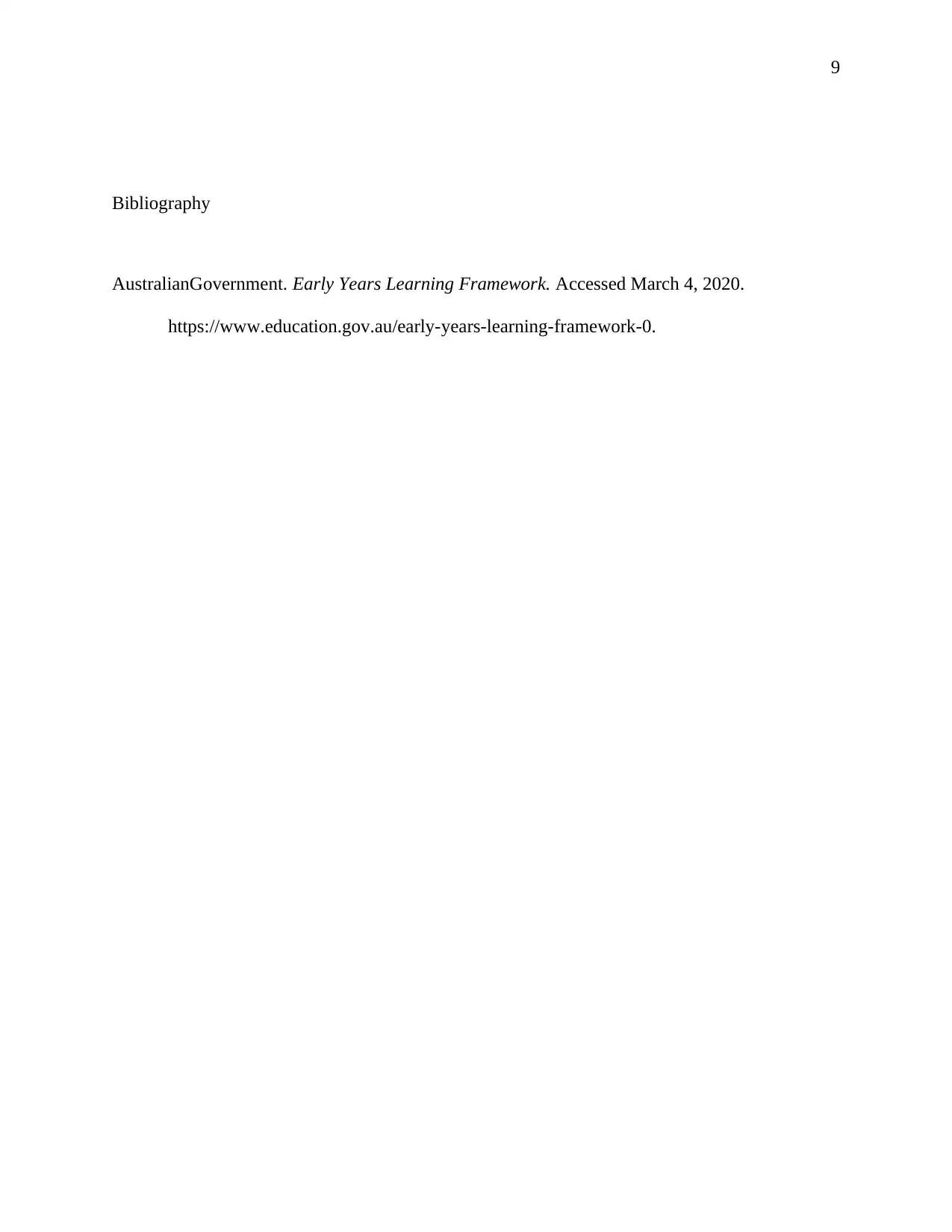
9
Bibliography
AustralianGovernment. Early Years Learning Framework. Accessed March 4, 2020.
https://www.education.gov.au/early-years-learning-framework-0.
Bibliography
AustralianGovernment. Early Years Learning Framework. Accessed March 4, 2020.
https://www.education.gov.au/early-years-learning-framework-0.
⊘ This is a preview!⊘
Do you want full access?
Subscribe today to unlock all pages.

Trusted by 1+ million students worldwide
1 out of 9
Related Documents
Your All-in-One AI-Powered Toolkit for Academic Success.
+13062052269
info@desklib.com
Available 24*7 on WhatsApp / Email
![[object Object]](/_next/static/media/star-bottom.7253800d.svg)
Unlock your academic potential
Copyright © 2020–2026 A2Z Services. All Rights Reserved. Developed and managed by ZUCOL.





